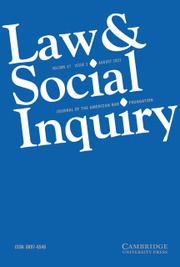Susan P. Shapiro considers the possible disconnect when a person dictates treatment preferences in advance directives for their future self in this article.
In this article, sociologist Susan P. Shapiro presents her research on the role of families in making end-of-life medical decisions on behalf of loved ones who lack the capacity to make them themselves.
This edition marks the 50th anniversary of the final book of five published on the ABF Survey on Criminal Justice Administration.
In this article, John Hagan hypothesizes that paternal incarceration affects the educational attainment of their children.
Susan Shapiro was interviewed by The Miami Herald about end-of-life decision-making for COVID-19 patients.
This article, featuring Stephen Daniels, surveys law students on experiential learning, the relation to career relevance, and preparedness upon graduation.
This chapter by Jothie Rajah analyses the Situation Room Photograph to illustrate transnational law as drama.
In light of challenges to the liberal international order, Tom Ginsburg asks, what would international law look like in an increasingly authoritarian world?
This policy brief provides a comprehensive analysis of recent U.S. law school enrollment trends, with particular attention to Asian Americans.
In this article, Susan P. Shapiro examines the failures and successes of advanced directives in the American medical system in the wake of the COVID-19 pandemic.
By drawing on After the JD Project data, this article examines changes in career structures at corporate law firms, which shape elite legal careers.

